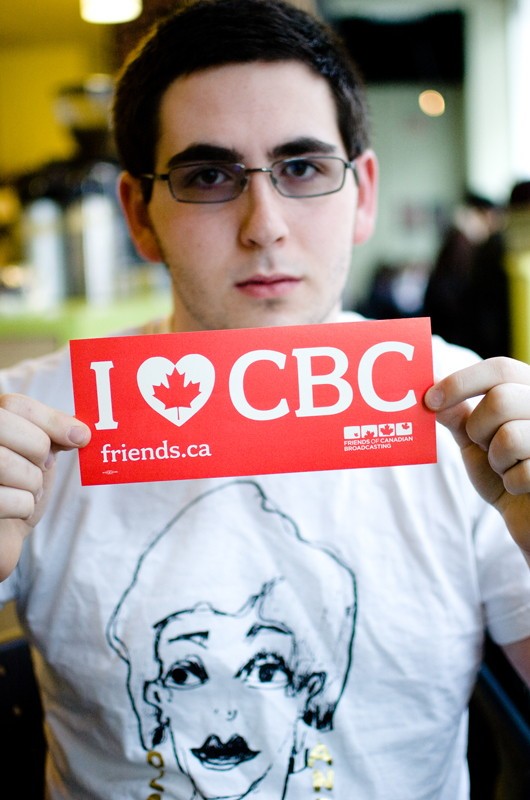Is CBC in danger?
Friends of Canadian Broadcasting discuss importance of Canadian media, dangers of losing federal funds
In response to recent comments from Stephen Harper’s administration about withdrawing federal funding from the CBC, Canadians have the opportunity to proclaim their affection for the Crown corporation by signing the “I Love CBC” petition.
Formulated by Friends of Canadian Broadcasting (Friends), the petition seeks to express public appreciation of the CBC and the need for continual federal funding. Thus far, over 93,000 individuals have signed.
Friends, founded in 1987, is a not-for-profit organization dedicated to critiquing the activity of both public broadcasting organizations and the government sects that fund them.
In the last month, Zach Fleisher, University of Winnipeg politics student and Friends volunteer, has diligently been putting forward the petition.
“On Nov. 23, Dean Del Mastro (Parliamentary Secretary to the Minister of Canadian Heritage) made a statement about the government ‘getting out of the public broadcasting business,’” he explained.
Fleisher also contends that the petition is a response to the funding stagnation that Canadian broadcasting is experiencing.
“Eighty dollars per person is the western average (for federal funding of public broadcasting),” Fleisher noted. “CBC receives $33 dollars per Canadian citizen.”
Jeff Keay, head of CBC media relations, says the threat of losing funding is nothing new.
“Resources are scarce, but it’s always been like that,” he said. “There is always danger that we can lose funding. The realities of deficit and economic crisis are plain to anyone. We had to cut many programs due to the economy.”
Ian Morrison, a spokesperson for Friends, stated that because media perpetuates Canadian cultural sovereignty, deteriorating funding for the CBC would have a vast impact on Canadian identity.
This is why it is imperative to be critical of the government when they mention removal of broadcast funding, Morrison noted.
However, he also believes programming choices made by broadcast companies also influence Canadian identity. Accordingly, Friends is also critical of the way public broadcasting agencies choose to operate.
“The CBC has turned its back on serious programming and is moving towards more pablum-type programming,” Morrison said. “We are not blind followers of them (CBC), we are strong critiques of their management.”
Keay, however, doesn’t believe these criticisms are always legitimate.
“They have criticized us for using non-Canadian programming. They were critical of the fact that Wheel Of Fortune and Jeopardy were in the prime-time schedule. For most of its history, though, the CBC has strategically made use of American broadcasting,” he said.
Nonetheless, Keay says the CBC is still appreciative of the organization.
“We (CBC) are owned by the taxpayer and we have a responsibility to be transparent and accountable,” he said. “If Friends has an issue with what we are doing we take that into account and respond to that.”
Morrison also argues that ownership concentration is one of the most troubling traits of Canadian media. That is, media companies in Canada are owned by a select few conglomerates. As a result, the public is only exposed to a fraction of viewpoints.
“Diversity is being reduced,” said Morrison. “There is always more than one side of a story, but we are not seeing all the sides.”
Published in Volume 65, Number 22 of The Uniter (March 10, 2011)







